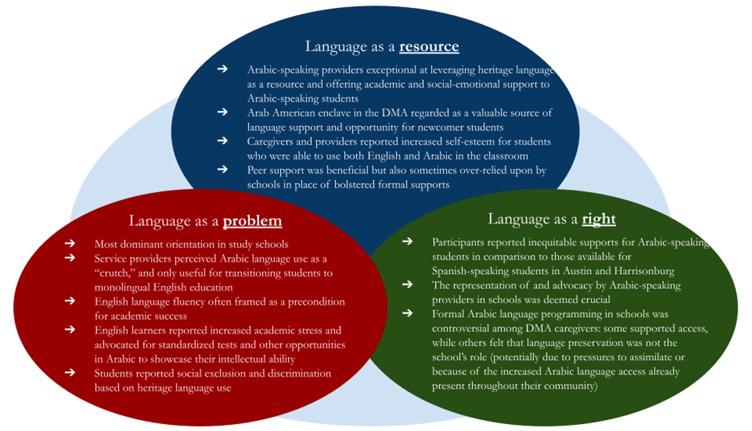
Something went Wrong
Try entering your email again or contact us at support@qfi.org
Try entering your email again or contact us at support@qfi.org
You’ll receive an email with a confirmation link soon.
Feb 23, 2023
By Alli Gillespie
Immigrant and refugee students resettling in the U.S. from countries in the Middle East and North Africa (MENA) region must navigate a new public education system alongside stressors such as forced migration, family separation and discrimination. What role do schools themselves play in supporting the wellbeing of these students and reducing the inequities that they face? Our team from the Study of Adolescent Lives after Migration to America (SALaMA) sought to explore this question and, as we gathered more evidence, one thing became clear: language learning and language preservation were integral aspects of the acculturation process for Arabic-speaking newcomer students and their communities. In a recent article published in the Journal of Refugee Studies, our team explores the ways in which educators approach language learning and how this connects with students’ wellbeing.
In the article, we looked at how often-subconscious biases towards heritage languages impact how language is discussed, researched and taught. Noted scholar, Richard Ruíz, has highlighted what he names the ‘language-as-a-problem’ orientation within U.S. schools that prioritizes English and disregards heritage language use. He offers two alternative language approaches: 1) The ‘language-as-a-resource’ orientation views multilingualism and cultural diversity as valuable tools to build community and improve students’ academic achievement and psychosocial wellbeing. 2) The ‘language-as-a-right’ orientation approaches language as a human right; it is concerned with how language mediates equitable access to resources and services, such as education.
To learn more about how schools and service providers approach language learning with newcomer students from the MENA region—and in what ways these approaches influence newcomer acculturation and wellbeing—we partnered with high schools in Austin, Texas; Harrisonburg, VA; and the Detroit Metropolitan Area (DMA), Michigan in 2018 and 2019. We conducted focus group discussions with adolescent students who immigrated from or whose parents immigrated from the MENA region (countries represented included Iraq, Syria, Yemen, Jordan, Sudan and Palestine), in-depth interviews with caregivers, and numerous key informant interviews with local teachers, language support paraprofessionals, youth therapists, case managers, school administrators, spiritual leaders and other service providers.
Analysis of our data revealed Ruíz’ typology playing out within our partner schools, as depicted in the figure below:
Ultimately, our findings reveal the inequities that newcomer students face in U.S. public schools due to language biases, and the vital role of Arabic-speaking service providers in supporting and advocating for students. Our article also highlights the implications of school-based language orientations on newcomer students’ academic success and overall wellbeing; while heritage language use has been historically deemed a ‘problem’ in schools, district leaders and educators have a responsibility to reorient language programming and policy efforts to align with heritage language as a resource and as a right to ensure that Arabic-speaking immigrant students have the support they need to thrive in their new communities.
Alli recently earned their Master of Social Work and Master of Public Health from the Brown School at Washington University in St. Louis, completing an individualized concentration in Gender, Migration, and Humanitarian Response. Alli’s research builds upon their prior studies in Social and Cultural Analysis at New York University and their past work in Field Human Resources at Médecins Sans Frontières/Doctors Without Borders (MSF). As a Research Manager with SALaMA, Alli has coordinated community partnerships, co-authored numerous journal articles, and launched the SALaMA Webinar Series to engage educators, practitioners, and policymakers in discussions about improving supports for newcomer adolescents.


